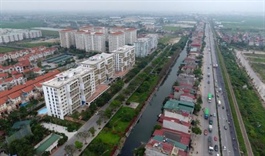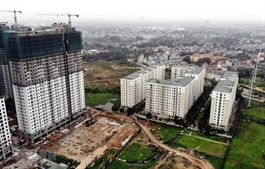Vietnam's pre-built warehouse sector encounters growth downturn
Vietnam's pre-built warehouse sector encounters growth downturn
The southern region of Vietnam is witnessing a lull in its pre-built warehouse sector following an era of energetic growth, as outlined in a recent review by Jones Lang LaSalle (JLL) Vietnam. This market cooldown was predicted in Q1/2023, forecasting a slowdown in demand.
The region has experienced a net absorption downturn by nearly 50,000 square metres, alongside an uptick in vacancy rates observed in pre-built warehouse ventures in Thu Dau Mot, Ben Cat (Binh Duong), and Long Thanh (Dong Nai).
JLL associates these emerging patterns to a stagnant cross-border commercial environment coupled with low-yield business operations, prompting manufacturing firms to scale down their ventures. This reduction is directly impacting the leasing efficiency of pre-built warehouses, particularly those located in manufacturing centres catering to the export sector.
During Q2/2023, the modern pre-built warehouse market did not record any additional supply, thus sustaining the existing stock at 1.8 million sq.m. Dominant market shares remain with developers BWID and Mapletree, representing 32 per cent and 22 per cent of the total supply respectively.
Rental prices for these warehouses have held steady at $4.7 per sq.m per month, marking a nominal 0.1 per cent increase compared to the preceding quarter. In light of the market's current sluggish momentum, landlords continue to exhibit flexibility, facilitating negotiations and offering support to their lessees.
Facilities located in north Binh Duong and south Dong Nai have noted a downward adjustment in rental prices, correlating with the heightened vacancy rate. These areas are primarily comprised of manufacturing plants with manufacturing firms as the principal tenants.
JLL predicts that the warehousing market, in the short term, will continue to be propelled by domestic demand. Although export activities are projected to rejuvenate growth towards the end of the year or early next year, the pace of recovery is expected to be gradual.
"Given the oscillations in the global economy, a trend towards downsizing is discernible among manufacturers. Investors and tenants have adopted a more prudent stance towards expanding business operations and initiating new projects, maintaining a 'wait and see' approach," according to JLL.
Cushman & Wakefield's prior report also indicated a persistent domestic demand for pre-built warehouses, while a deceleration was observed in the manufacturing and export sectors. The demand for warehouse space is principally maintained by domestic markets, specifically the retail, e-commerce, and logistics sectors serving the domestic arena. However, the manufacturing and export sectors have witnessed a notable downturn.
This trend led to a net absorption of just 6,400sq.m and a fill rate of 73 per cent is stable quarterly, but marks a 4 percentage point decrease on-year.
Simultaneously, the market recorded nearly 46,000sq.m of fresh supply from the Emergent Le Minh Xuan 3, a Grade-A project in Ho Chi Minh City. This has pushed the total market supply up to 5.14 million sq.m, a surge of 11.4 per cent on-year.
By 2026, the market is projected to welcome an additional 1.3 million sq.m of warehouses, indicating an annual growth rate of 5.1 per cent.
Trang Bui, general director of Cushman & Wakefield Vietnam, suggests that the escalating competition due to the plentiful pre-built warehouse supply could prompt landlords to propose more compelling rental policies and incentives to draw tenants.



























